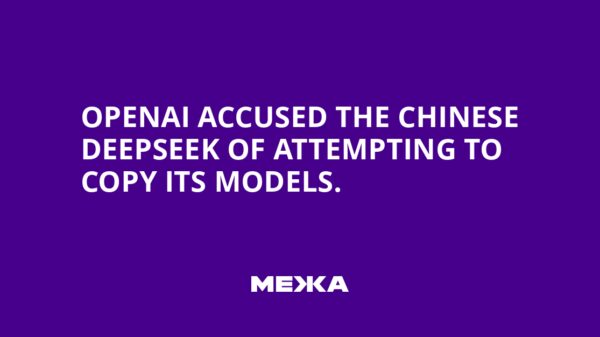Neuxnet, a Chinese technology company, is carving out a significant presence in the Middle East’s digital landscape with its enterprise-level AI solutions. Founded in 2015 by serial entrepreneur Zhang Lei, Neuxnet initially focused on consumer-facing products before shifting to business-to-business (B-end) services in 2021. The company’s revenue, which is nearing $30 million, is bolstered by its AI segment, expected to account for two-thirds of its earnings by next year. Neuxnet’s success is particularly notable as it operates in the finance, infrastructure, and culture and tourism sectors, tapping into a market projected to grow by $400 billion over the next decade.
The Middle East, particularly through initiatives like Saudi Arabia’s “Vision 2030” and “Smart Dubai,” is embracing advanced technologies with the same fervor as many major global economies. Neuxnet’s self-developed EAIP platform is at the forefront, offering full-stack solutions that automate over 50% of manual processes across various applications. This strategic focus on deep localization, coupled with its adaptable mid-platform AI capabilities, sets Neuxnet apart from competitors, which include well-established firms from the U.S. and Europe.
As the Middle East undergoes a digital transformation reminiscent of China’s earlier advancements, local banks and insurance companies are increasingly adopting AI systems to enhance operational efficiency. For instance, AI is being integrated into credit card review processes in Saudi banks and is streamlining vehicle insurance claims in the region. This presents an enormous opportunity for companies like Neuxnet, which has positioned itself as a provider of high-value AI services rather than merely a low-cost alternative.
Zhang Lei, who has extensive experience in the telecommunications sector, including roles at Huawei and Baidu, recognized the potential for AI applications in the Middle East after his initial foray into consumer markets met regulatory challenges. With the realization that the global market landscape had shifted, he pivoted Neuxnet’s strategy towards enterprise solutions, identifying the Middle East as a “high-value market” compared to others like the U.S., South America, and Europe.
Neuxnet has faced competition from American companies that excel in high-end technologies, Europeans who have a strong foothold across various industries, and Indian firms that offer low-cost service options. However, the company has distinguished itself with a focus on high-tech applications and efficient communication models that do not rely on the low-cost strategies typical of its Indian counterparts. This approach emphasizes customized solutions rather than standardized products, enabling Neuxnet to meet specific customer demands quickly.
Central to Neuxnet’s operational model is the EAIP platform, which focuses on three key areas: communication technology, enterprise AI capabilities, and AI agents. The latter has seen significant success, especially in automating business processes in sectors such as finance and insurance. Neuxnet has successfully deployed AI solutions that have markedly improved the accuracy and automation of tasks, such as increasing the recognition rate of credit card reviews from 30% to 80% at a major retail bank.
Despite the company’s achievements, Neuxnet remains prudent in its expansion strategy. The firm is concentrating its efforts on finance, infrastructure, and culture and tourism within the Middle East while retaining a more selective approach in Southeast Asia and focusing on energy in Europe. This “nail” strategy underlines the importance of deep industry knowledge, allowing the company to accumulate specialized insights and build an insurmountable competitive advantage.
Zhang Lei emphasizes that the key to Neuxnet’s ongoing success lies in transforming cutting-edge AI technologies into standardized solutions tailored to industry challenges. By avoiding direct competition with larger technology firms on foundational AI models, Neuxnet is instead committed to addressing practical engineering issues that arise when deploying AI at scale. The next decade promises significant growth for AI, and as Neuxnet navigates this evolving landscape, it stands poised to capitalize on vast opportunities that continue to emerge globally.
See also Inspira Enterprise Appoints Swetha Srivastava as Practice Head for Data Analytics and AI
Inspira Enterprise Appoints Swetha Srivastava as Practice Head for Data Analytics and AI TD Bank’s Chad Koziel Reveals AI Strategy to Scale Solutions Responsibly
TD Bank’s Chad Koziel Reveals AI Strategy to Scale Solutions Responsibly Anthropic Launches Claude Opus 4.5 Following $350B Valuation Surge from Microsoft, Nvidia
Anthropic Launches Claude Opus 4.5 Following $350B Valuation Surge from Microsoft, Nvidia Ashley Launches AI-Powered Shopping Experience with PayPal for Seamless Transactions
Ashley Launches AI-Powered Shopping Experience with PayPal for Seamless Transactions AI Shopping Traffic Surges 830% as Generative Tools Reshape Holiday Retail Strategies
AI Shopping Traffic Surges 830% as Generative Tools Reshape Holiday Retail Strategies






































































